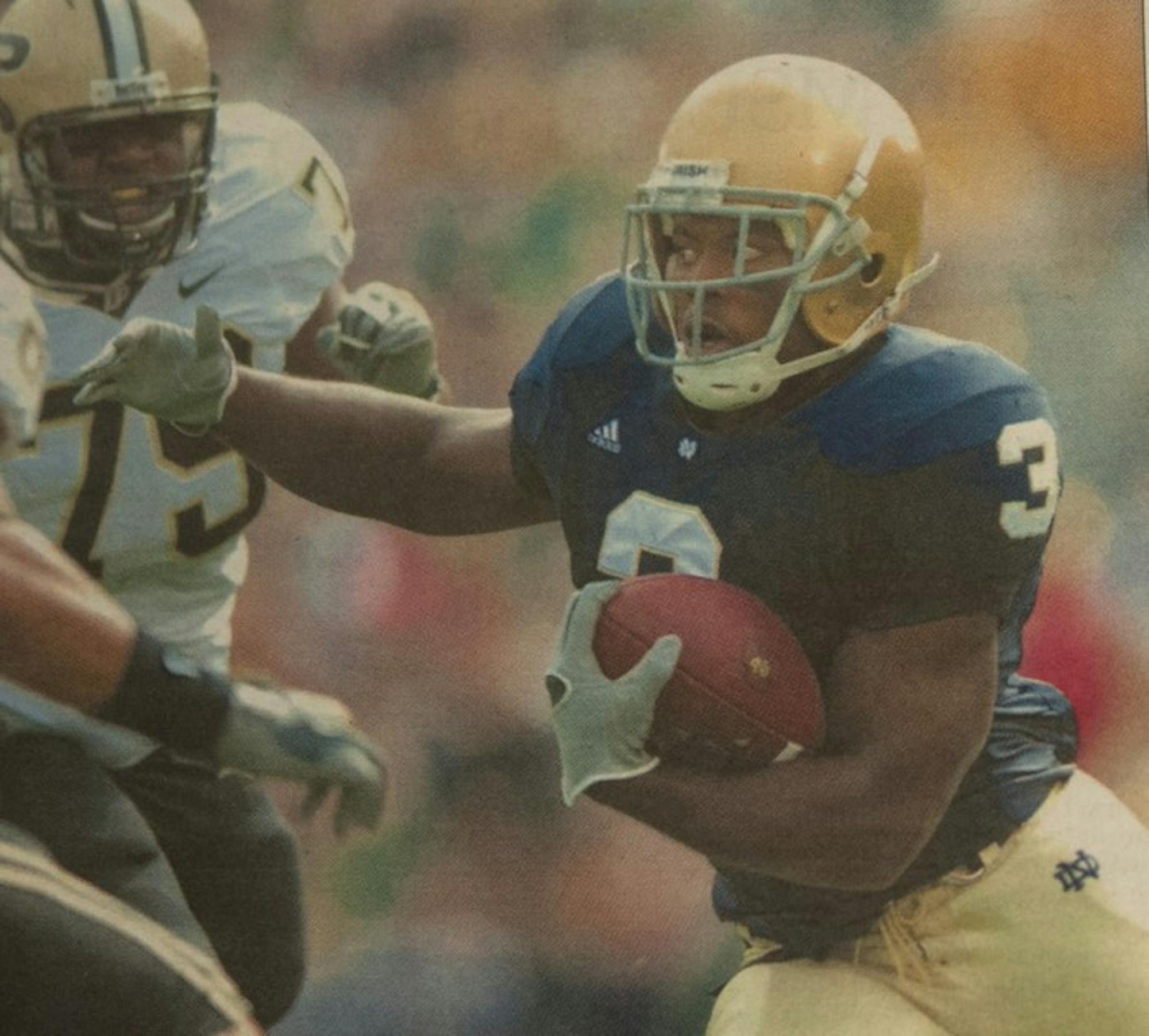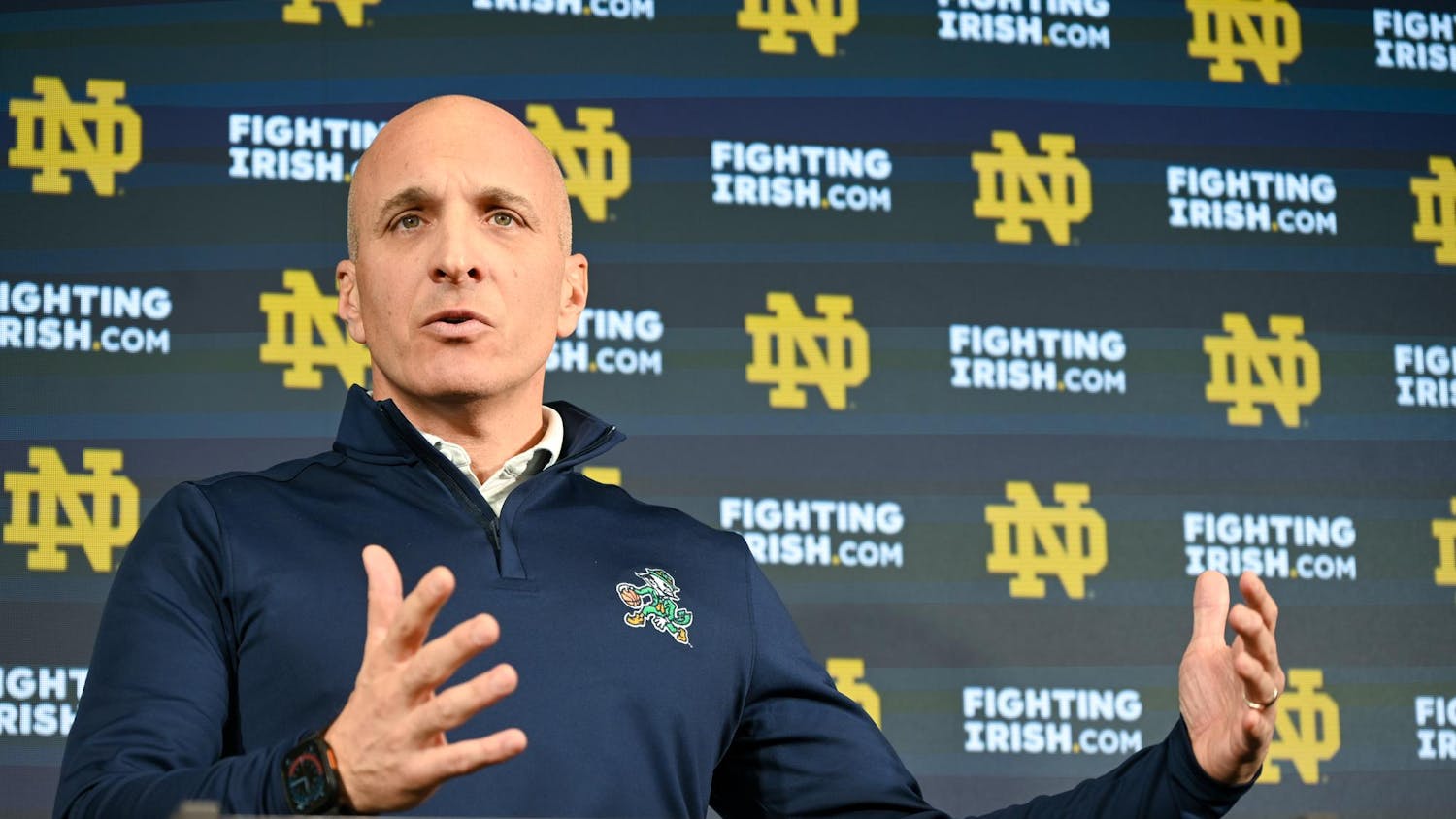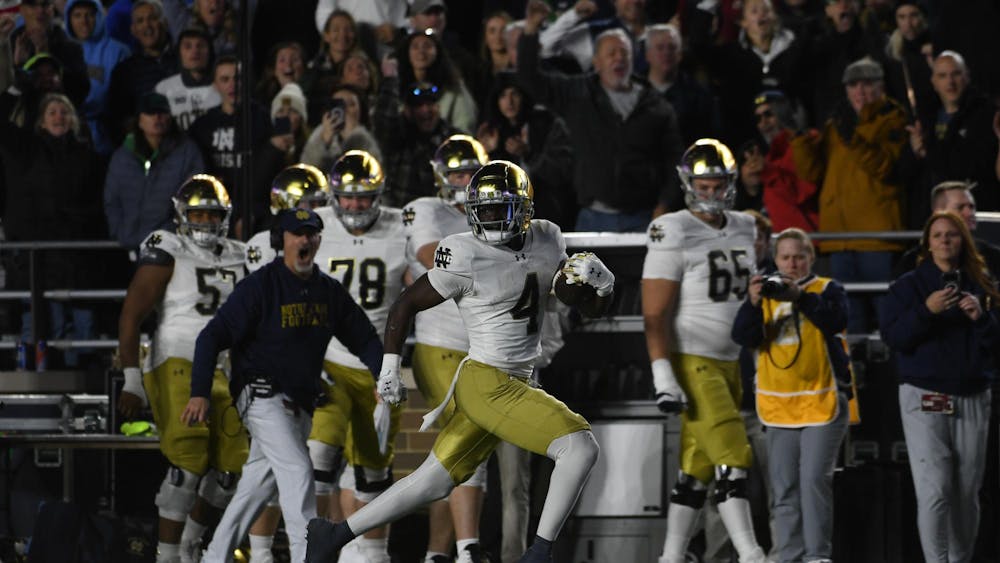When selecting where he would play collegiate football, one of the main criteria for Darius Walker was a national presence. When he got to Notre Dame, the former Irish running back was focused on leaving a legacy.
Two games into his freshman season in 2004, Walker was well on his way to fulfilling both objectives.
After a season-opening loss to BYU in Utah, the Irish returned home to host Michigan. Walker scored two fourth-quarter touchdowns and rushed 31 times for 115 yards as the Irish knocked off the No. 9 Wolverines.
A few hours after the game, Walker trudged back toward his room in O’Neill Hall. He walked up to his section, 2B, and stopped. A line of “probably 30 to 40 people” waited in front of Walker’s door.
“I was like, ‘Oh, my goodness. What in the world is going on?’ I’m like 18 at the time, so I have no idea what’s happening,” Walker said recently by phone. “It scared me off.”

“We’re your biggest fans.”
“You’re our savior.”
Women had left their phone numbers.
“It was the most ridiculous thing I had ever seen, but it was also the most humbling thing that I had ever seen,” Walker said. “What I had done had made that much of an impact on so many people. So it was sort of my induction, if you will, into the craziness that is Notre Dame football and what it really means to a lot of people.”
Notre Dame or Stanford?
In addition to his desires for a legacy and a nationally prominent program, Walker’s other key emphasis in his collegiate decision-making process was education. Walker’s mother, who was an academic counselor for many years, instilled a homework-first, sports-second mentality in Walker. Considering his criteria, Walker’s college choice came down to Notre Dame and Stanford.
The running back took a visit to Notre Dame during November 2003 — Walker’s senior season at Buford (Georgia) High School. Armed with merely a recently purchased sweatshirt, Walker recalled stepping off the plane into “blistering cold” weather with “two or three” feet of snow lining the runway.
“The wind and cold just disrespected my jacket,” Walker said laughingly.
Despite witnessing No. 5 Florida State’s 37-0 flattening of the Irish, Walker was drawn to the communal atmosphere between the student section and the players after the loss.
“In all honesty, for me, that’s what really made me say, ‘OK, this is a place that I’d be honored to attend,’” Walker said.
Three Years and a Legacy
In his first season, Walker set the Irish freshman rushing record with 786 yards. The following season, Walker racked up 1,196 rushing yards to go along with 43 receptions for 351 yards. In 2006, Walker scampered for 1,267 yards while adding 56 grabs for 391 more yards.
Following his junior campaign, Walker declared for the 2007 NFL Draft. In his three collegiate seasons, Walker set and broke the record for most catches by an Irish running back. He departed as the school’s fourth-leading rusher with 3,249 career yards.
“I wanted to be known as one of the best players at my position to ever come through the school,” Walker said. “… I really felt at that point I had accomplished what I had set out to do at Notre Dame, which made the decision to go pro that much easier for me.”
In many ways, Walker is the last true feature back at Notre Dame, the last great, all-purpose back. In the past 10 seasons, only one other running back (Cierre Wood in 2011) has reached 1,000 yards. In the past 10 seasons, no other running back has handled the vast majority of the workload as Walker did in 2005 and 2006, when he toted the rock 253 and 255 times, respectively. In the post-Walker years, the Notre Dame backfield always has featured a combination, involving the likes of James Aldridge, Armando Allen, Robert Hughes, Wood, Jonas Gray and Theo Riddick.
“It really takes an effort on your part to stay in the training room after everyone has gone,” Walker said of his workhorse ability.
The State of the Running Back Position
Notre Dame’s recent running back rotations are representative of shifts in the position across the football world at large. Timeshares have become staples in backfields across the country.
“It’s two-fold in that you get a fresh guy in the committee, and then you also keep the defense off balance depending on what type of style that guy has,” Walker said of current running back strategy.
Walker had to be the all-around back with the Irish. Now, there’s a lessening importance placed on the do-it-all, frontline running back. Since 2000, only one non-quarterback — former Alabama running back Mark Ingram in 2009 — has won the Heisman Trophy.
“It is kind of disheartening to see the importance of the position diminish,” Walker said. “You have teams now in the NFL who feel like they can get a good running back in the fifth, sixth or seventh round.”
Life after Notre Dame
Walker himself, however, went undrafted after foregoing his senior season at Notre Dame. Walker decided to join the Houston Texans, drawn to then-Texans running backs Ahman Green and Ron Dayne, whom Walker grew up admiring.
Walker started two games as a rookie and spent four seasons in the NFL before retiring in 2010.
Soon thereafter, he joined a local ESPN Radio station in Denver as a talk-show host for a year-and-a-half. From there, Walker served as a sideline reporter for the now-defunct MountainWest Sports Network before doing more sideline jobs, color commentary and studio work for FOX Sports in Los Angeles.
In the offseason, Walker found himself with a lot of free time.
“Since I had the Notre Dame degree, I felt like I’d be remiss if I didn’t go in and use that to a full effect,” Walker said.
Having established a pipeline of contacts in the entertainment and sports industries with access to capital, Walker used his network to become a financial advisor at Morgan Stanley in the private wealth division.
For more than a year with Morgan Stanley, Walker has built up a group of clients that includes entertainers, actors, endowments and foundations.
“It’s just been an amazing transition for me,” Walker said. “The crowd I run around with now is one that it’s pretty difficult to get into some of these circles. I consider myself pretty lucky to have another opportunity like what I have at Morgan Stanley.”
Never one to be one-dimensional, Walker also works now for ESPN as a color commentator. He recently called a Louisville-Murray State game and the Memphis-Middle Tennessee State matchup.
“It keeps me busy literally seven days a week,” Walker said. “I work Monday through Friday as a banker, and on the weekends, I’m a broadcaster.”
Still the same do-it-all Walker.









